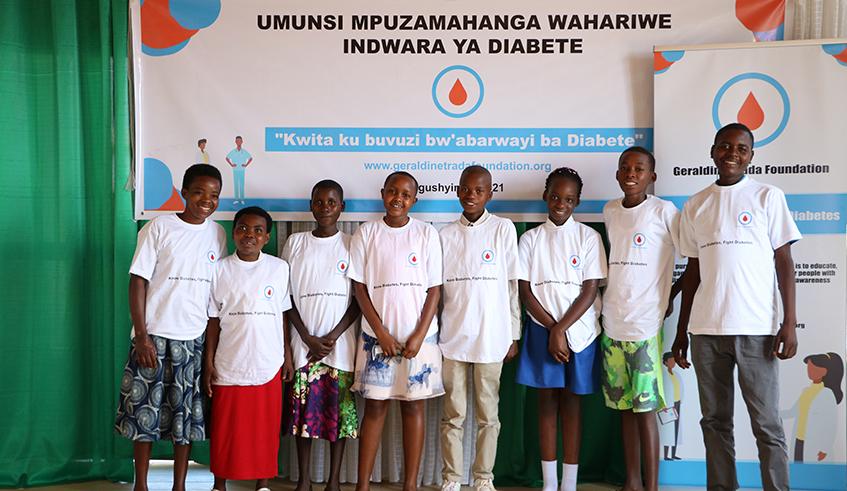Africa-Press – Rwanda. Children living with Type 1 diabetes were on Tuesday November 23 joined by their families, activists and medical workers to celebrate World Diabetes Day which is internationally marked on November 14.
The event was organised by Geraldine Trada Foundation a charity started by a Rwandan national living in the United Kingdom, which helps children with this type of diabetes to cope with the disease, which is chronic in nature.
The foundation was started by Tracey Trada Mutesi, after the death of her father due to complications associated with diabetes and the diagnosis of her daughter with Type 1 Diabetes at the age of 12. The daughter is now 17.
Since its inception in Rwanda, the foundation has worked to raise diabetes awareness and advocacy, as well as to engage, empower, and provide a safe space for people with diabetes, particularly children from low-income families. The foundation currently supports 17 beneficiaries, mostly children.
Under this year’s theme of ‘access to diabetes care,’ the foundation invited an endocrinologist to discuss the causes of this lifelong disease, raise awareness, and explain and highlight proper medication administration so that people can live well with it.
“Children with a family history of diabetes should be regularly monitored by a doctor and diagnosed by the age of 8 or slightly older before it is too late,” said Dr. Bernabe Shungu, Head of Medicine Non-Communicable Diseases (NCDs) services at Muhima Hospital.
He suggested that people must first understand the causes of diabetes before being taught how to live with it. Diabetes is in two categories, according to him. Type 1 diabetes is caused by a lack of insulin in the body, but Type 2 diabetes is caused by insulin dysfunction or resistance, he added.
Insulin is a hormone produced by the pancreas that helps to regulate blood glucose levels. Hypoglycemia and Hyperglycemia are conditions in which the blood sugar level is too low or too high, respectively, due to a lack of insulin.
“In most situations, Type 1 diabetes is inherited, but Type 2 diabetes affects people over the age of 30,” he explained. “For a child born with Type 1, symptoms appear later, when they are beyond the age of 8, and if nothing is done, their body enters a state known as ketosis, in which fats are used for energy instead of glucose. It has an impact on their growth and many other aspects of their lives, and they may lapse into a coma,” he continued.
He urged people to be on the lookout for signs and symptoms. Having very dry skin, losing weight easily, feeling very weary or having general body weakness, losing concentration easily, severe hunger or food cravings, feeling thirsty, and the desire to urinate are just a few examples.
According to the Diabetes Atlas, diabetes affects roughly 3.16 percent of Rwanda’s population, resulting in 1,918 diabetes-related deaths per year. In an interview, Mutesi called for collective efforts to fight against the stigmatization faced by children living with diabetes type 1 and to assist those from poor backgrounds in receiving basic medical care, saying that they are the future.
“I was diagnosed with diabetes at the age of ten”. “I’d be thirsty all of the time and needed to urinate frequently. I began to feel ill on a regular basis, and when my parents took me to the hospital, I was diagnosed with Type 1 diabetes, as was my 6-year-old sister,” said Kelia Mugabo, a senior three-student who shared her story at the event.
“I can testify that if you follow the doctor’s advice and take your prescription on time, you will be okay. It’s been three years since my last hospitalization”.
She advised: “So we didn’t choose it but we can live well with it,” she added. According to Mutesi, the discovery of insulin 100 years ago was one of the greatest medical breakthroughs ever made.
“It meant that type 1 diabetes was no longer a death sentence.”
She added: “So as we look on the bright side we also want to celebrate and raise awareness not only on World Diabetes Day but the entire month and highlight the resilience of everyday heroes like those living with type 1 diabetes” said Mutesi.
For More News And Analysis About Rwanda Follow Africa-Press






